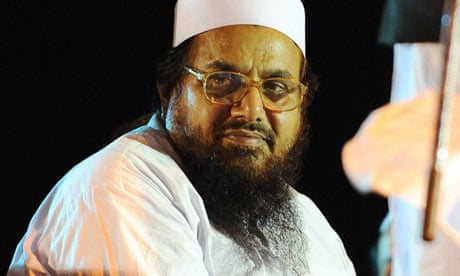A Pakistani court ordered the release of the founder of banned Pakistani militant group Lashkar-e-Taiba because there was insufficient evidence to link him to last year's deadly Mumbai attacks, his lawyer said today.
India immediately condemned the ruling as confirmation that Pakistan is not serious about bringing to justice militants whose repeated attacks across the border have inflamed tensions between the nuclear-armed rivals.
The Lahore high court's decision to free Hafiz Muhammad Saeed from house arrest came as tensions are rising in Pakistan's north-west along the Afghan border. Security forces early today rescued dozens of students and others kidnapped by militants, and the army continued to battle Taliban fighters in the Swat valley.
India has demanded that Pakistan vigorously pursue those behind the November siege of its commercial capital that killed 166 people and left nine of 10 gunmen dead. The survivor, Pakistani Mohammed Ajmal Kasab, was captured and is on trial in India.
Saeed was among several suspects taken into custody in December in Pakistan, which came under tremendous pressure from the United States and other governments to investigate domestic links to the attacks.
The 59-year-old cleric created Lashkar-e-Taiba in the late 1980s to fight Indian rule in Kashmir, the mostly Muslim Himalayan region claimed by both India and Pakistan. The group, which is believed to have supporters within Pakistan's intelligence agency, was banned by Pakistan in a security clampdown after the September 11 attacks in the United States. Washington lists it as a terrorist organisation.
But the group re-emerged as Jamaat-ud-Dawa, which Saeed says is a charity with no links to terrorism. After the Mumbai attacks the United Nations listed Jamat-ud-Dawa as a front for Lashkar-e-Taiba, prompting Pakistan to freeze the group's assets and put its leaders under house arrest.
Pakistan has not publicly announced any indictment or charge against Saeed, and it is unclear what role he is suspected of playing in the Mumbai attacks.
Saeed challenged his detention in court, and lawyer AK Dogar emerged from a hearing today and said a three-judge panel had decided the detention was "against the law and constitution of the country". Supporters of Saeed shouted "God is great!"
"We are unhappy that Pakistan does not show the degree of seriousness and commitment that it should to bring to justice perpetrators of the Mumbai terror attack," India's home minister, Palaniappan Chidambaram, told reporters in New Delhi after the ruling.
India's foreign ministry issued a statement that Saeed's "professed ideology and public statements leave no doubt as to his terrorist inclinations".
Saeed, who remained in his home near Lahore immediately after the decision, told Pakistan's Geo news channel by telephone that the case against him was an "international conspiracy" and said the ruling supported his contention that Jamat-ud-Dawa is not a terrorist organisation.
Earlier today, security forces rescued 80 students, teachers and staff from a boys' school who had been taken captive by militants the night before in the North Waziristan tribal region near Afghanistan, army spokesman Major General Athar Abbas said.
The region is an al-Qaida and Taliban stronghold from which militants are thought to launch attacks inside Afghanistan. Abbas said violence in the region in recent days marked an effort by the Taliban to divert the military's attention from the battle in Swat.
Recent clashes have fuelled speculation the military may widen its Swat offensive to South Waziristan.
Journalists have limited access to the tribal areas and Swat, making it difficult to independently verify information from the Pakistani military or other sources.
